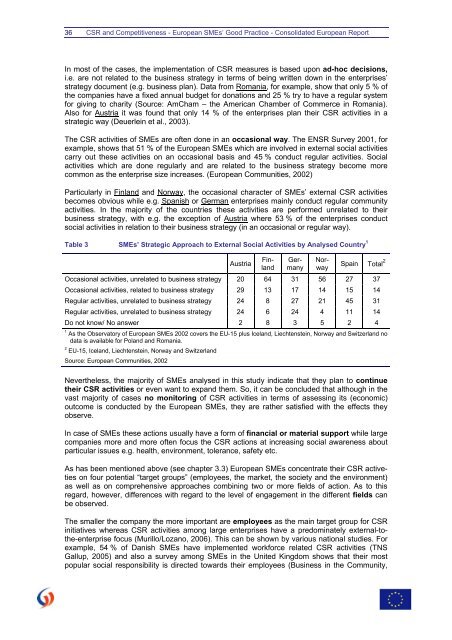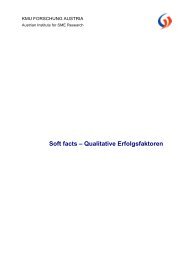CSR and Competitiveness European SMEs - KMU Forschung Austria
CSR and Competitiveness European SMEs - KMU Forschung Austria
CSR and Competitiveness European SMEs - KMU Forschung Austria
You also want an ePaper? Increase the reach of your titles
YUMPU automatically turns print PDFs into web optimized ePapers that Google loves.
36 <strong>CSR</strong> <strong>and</strong> <strong>Competitiveness</strong> - <strong>European</strong> <strong>SMEs</strong>’ Good Practice - Consolidated <strong>European</strong> Report<br />
In most of the cases, the implementation of <strong>CSR</strong> measures is based upon ad-hoc decisions,<br />
i.e. are not related to the business strategy in terms of being written down in the enterprises’<br />
strategy document (e.g. business plan). Data from Romania, for example, show that only 5 % of<br />
the companies have a fixed annual budget for donations <strong>and</strong> 25 % try to have a regular system<br />
for giving to charity (Source: AmCham – the American Chamber of Commerce in Romania).<br />
Also for <strong>Austria</strong> it was found that only 14 % of the enterprises plan their <strong>CSR</strong> activities in a<br />
strategic way (Deuerlein et al., 2003).<br />
The <strong>CSR</strong> activities of <strong>SMEs</strong> are often done in an occasional way. The ENSR Survey 2001, for<br />
example, shows that 51 % of the <strong>European</strong> <strong>SMEs</strong> which are involved in external social activities<br />
carry out these activities on an occasional basis <strong>and</strong> 45 % conduct regular activities. Social<br />
activities which are done regularly <strong>and</strong> are related to the business strategy become more<br />
common as the enterprise size increases. (<strong>European</strong> Communities, 2002)<br />
Particularly in Finl<strong>and</strong> <strong>and</strong> Norway, the occasional character of <strong>SMEs</strong>’ external <strong>CSR</strong> activities<br />
becomes obvious while e.g. Spanish or German enterprises mainly conduct regular community<br />
activities. In the majority of the countries these activities are performed unrelated to their<br />
business strategy, with e.g. the exception of <strong>Austria</strong> where 53 % of the enterprises conduct<br />
social activities in relation to their business strategy (in an occasional or regular way).<br />
Table 3 <strong>SMEs</strong>’ Strategic Approach to External Social Activities by Analysed Country 1<br />
<strong>Austria</strong><br />
Finl<strong>and</strong> <br />
Germany <br />
Norway<br />
Spain Total 2<br />
Occasional activities, unrelated to business strategy 20 64 31 56 27 37<br />
Occasional activities, related to business strategy 29 13 17 14 15 14<br />
Regular activities, unrelated to business strategy 24 8 27 21 45 31<br />
Regular activities, unrelated to business strategy 24 6 24 4 11 14<br />
Do not know/ No answer 2 8 3 5 2 4<br />
1<br />
As the Observatory of <strong>European</strong> <strong>SMEs</strong> 2002 covers the EU-15 plus Icel<strong>and</strong>, Liechtenstein, Norway <strong>and</strong> Switzerl<strong>and</strong> no<br />
data is available for Pol<strong>and</strong> <strong>and</strong> Romania.<br />
2<br />
EU-15, Icel<strong>and</strong>, Liechtenstein, Norway <strong>and</strong> Switzerl<strong>and</strong><br />
Source: <strong>European</strong> Communities, 2002<br />
Nevertheless, the majority of <strong>SMEs</strong> analysed in this study indicate that they plan to continue<br />
their <strong>CSR</strong> activities or even want to exp<strong>and</strong> them. So, it can be concluded that although in the<br />
vast majority of cases no monitoring of <strong>CSR</strong> activities in terms of assessing its (economic)<br />
outcome is conducted by the <strong>European</strong> <strong>SMEs</strong>, they are rather satisfied with the effects they<br />
observe.<br />
In case of <strong>SMEs</strong> these actions usually have a form of financial or material support while large<br />
companies more <strong>and</strong> more often focus the <strong>CSR</strong> actions at increasing social awareness about<br />
particular issues e.g. health, environment, tolerance, safety etc.<br />
As has been mentioned above (see chapter 3.3) <strong>European</strong> <strong>SMEs</strong> concentrate their <strong>CSR</strong> activeties<br />
on four potential “target groups” (employees, the market, the society <strong>and</strong> the environment)<br />
as well as on comprehensive approaches combining two or more fields of action. As to this<br />
regard, however, differences with regard to the level of engagement in the different fields can<br />
be observed.<br />
The smaller the company the more important are employees as the main target group for <strong>CSR</strong><br />
initiatives whereas <strong>CSR</strong> activities among large enterprises have a predominately external-tothe-enterprise<br />
focus (Murillo/Lozano, 2006). This can be shown by various national studies. For<br />
example, 54 % of Danish <strong>SMEs</strong> have implemented workforce related <strong>CSR</strong> activities (TNS<br />
Gallup, 2005) <strong>and</strong> also a survey among <strong>SMEs</strong> in the United Kingdom shows that their most<br />
popular social responsibility is directed towards their employees (Business in the Community,




